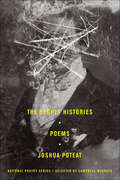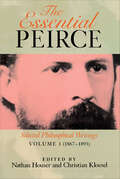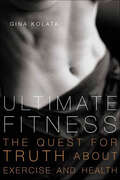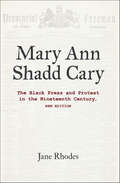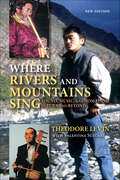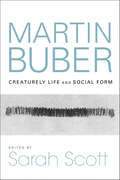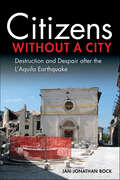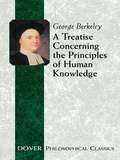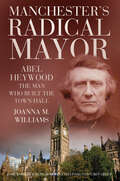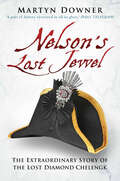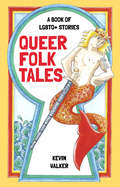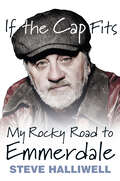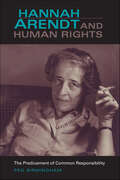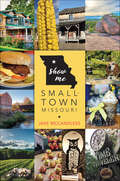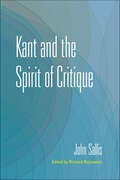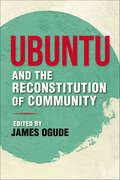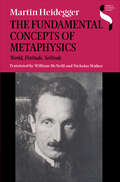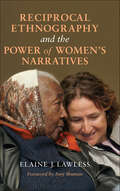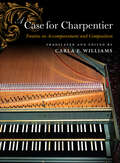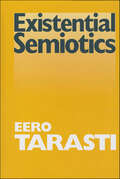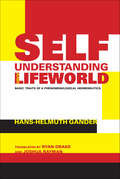- Table View
- List View
The Regret Histories: Poems
by Joshua PoteatThis powerful and provocative new installment of poetry is a recipient of the 2014 National Poetry Series Prize, as chosen by Campbell McGrath.The National Poetry Series’s long tradition of promoting exceptional poetry from lesser-known poets delivers another outstanding collection of poetry by Joshua Poteat.Through an investigation of the haunted spaces where history collides with the modern southern American landscape, The Regret Histories explores themes of ruin and nostalgia, our relationship to a collective past, and the extraordinary indifference of time to memory.For thirty years, the National Poetry Series has discovered many new and emerging voices and has been instrumental in launching the careers of poets and writers such as Billy Collins, Mark Doty, Denis Johnson, Marie Howe, and Sherod Santos.
The Essential Peirce, Volume 1: Selected Philosophical Writings (The Essential Peirce)
by Nathan Houser and Christian Kloesel" . . . a first-rate edition, which supersedes all other portable Peirces. . . . all the Peirce most people will ever need." —Louis Menand, The New York Review of Books"The Monist essays are included in the first volume of the compact and welcome Essential Peirce; they are by Peirce's standards quite accessible and splendid in their cosmic scope and assertiveness." —London Review of BooksA convenient two-volume reader's edition makes accessible to students and scholars the most important philosophical papers of the brilliant American thinker Charles Sanders Peirce. This first volume presents twenty-five key texts from the first quarter century of his writing, with a clear introduction and informative headnotes. Volume 2 will highlight the development of Peirce's system of signs and his mature pragmatism.
Chocolates for Breakfast: A Novel
by Pamela Moore“A gem of adolescent disaffection featuring a Holden Caulfield-like heroine.” — Vogue.com“Once I started reading it, I didn’t want to stop. . . . If your all-time favorite books include works of young-adult fiction (like Catcher), I strongly urge you to take a look." — USA Today/Pop CandyA riveting coming-of-age story, Chocolates for Breakfast became an international sensation upon its initial publication in 1956, and still stands out as a shocking and moving account of the way teenagers collide, often disastrously, against love and sex for the first time. This edition includes an introduction by author Emma Straub.Courtney Farrell is a disaffected, sexually precocious fifteen-year-old. She splits her time between Manhattan, where her father works in publishing, and Los Angeles, where her mother is a still-beautiful Hollywood actress. After a boarding-school crush on a female teacher ends badly, Courtney sets out to learn everything fast. Her first drink is a very dry martini, and her first kiss the beginning of a full-blown love affair with an older man.
Ultimate Fitness: The Quest for Truth about Exercise and Health
by Gina KolataThe bestselling science reporter for The New York Times tells us what works and what doesn't when we work outUltimate Fitness: The Quest for Truth About Exercise and Health is Gina Kolata's compelling journey into the world of American physical fitness over the past thirty years. It is a funny, eye-opening, brow-sweating investigation into the fads, fictions, and science of fitness training.From the early days of jogging, championed by Jim Fixx— who later died of a heart attack—to weight lifting, cycling, aerobics, and Spinning, Kolata questions such popular notions as the "fat-burning zone" and "spot reducing," the effects of food on performance, how much exercise helps build fitness, and the difference between exercise to help the heart and exercise to change the body. She explains the science of physical fitness and the objective evidence behind commonly accepted prescriptions. Along the way she profiles researchers and mavericks who have challenged conventional wisdom, marketed their inventions, and sometimes bucked criticism only to back down from their original claims.Ultimate Fitness spotlights the machines and machinations of the fitness industry, and cuts through the marketing and hype not only to assess what is healthy, but also to understand what our obsession with staying healthy says about American culture today.
Mary Ann Shadd Cary: The Black Press and Protest in the Nineteenth Century
by Jane RhodesMary Ann Shadd Cary was a courageous and outspoken nineteenth-century African American who used the press and public speaking to fight slavery and oppression in the United States and Canada. Part of the small free black elite who used their education and limited freedoms to fight for the end of slavery and racial oppression, Shadd Cary is best known as the first African American woman to publish and edit a newspaper in North America. But her importance does not stop there. She was an active participant in many of the social and political movements that influenced nineteenth century abolition, black emigration and nationalism, women's rights, and temperance. Mary Ann Shadd Cary: The Black Press and Protest in the Nineteenth Century explores her remarkable life and offers a window on the free black experience, emergent black nationalisms, African American gender ideologies, and the formation of a black public sphere. This new edition contains a new epilogue and new photographs.
Where Rivers and Mountains Sing: Sound, Music, and Nomadism in Tuva and Beyond
by Theodore Levin Valentina SüzükeiTheodore Levin takes readers on a journey through the rich sonic world of inner Asia, where the elemental energies of wind, water, and echo; the ubiquitous presence of birds and animals; and the legendary feats of heroes have inspired a remarkable art and technology of sound-making among nomadic pastoralists. As performers from Tuva and other parts of inner Asia have responded to the growing worldwide popularity of their music, Levin follows them to the West, detailing their efforts to nourish global connections while preserving the power and poignancy of their music traditions.
Martin Buber: Creaturely Life and Social Form (New Jewish Philosophy and Thought)
by Sarah ScottA new collection of essays highlighting the wide range of Buber's thought, career, and activism. Best known for I and Thou, which laid out his distinction between dialogic and monologic relations, Martin Buber (1878–1965) was also an anthologist, translator, and author of some seven hundred books and papers. Martin Buber: Creaturely Life and Social Form, edited by Sarah Scott, is a collection of nine essays that explore his thought and career.Martin Buber: Creaturely Life and Social Form shakes up the legend of Buber by decentering the importance of the I-Thou dialogue in order to highlight Buber as a thinker preoccupied by the image of relationship as a guide to spiritual, social, and political change. The result is a different Buber than has hitherto been portrayed, one that is characterized primarily by aesthetics and politics rather than by epistemology or theology. Martin Buber: Creaturely Life and Social Form will serve as a guide to the entirety of Buber's thinking, career, and activism, placing his work in context and showing both the evolution of his thought and the extent to which he remained driven by a persistent set of concerns.
Citizens without a City: Destruction and Despair after the L'Aquila Earthquake
by Jan-Jonathan BockIn 2009, after seismic tremors struck the Italian mountain town of L'Aquila, survivors were subjected to a "second earthquake"—invasive media attention and a relief effort that left them in a state of suspended citizenship as they were forcibly resettled and had to envision a new future.In Citizens without a City, Jan-Jonathan Bock reveals how a disproportionate government response exacerbated survivors' sense of crisis, divided the local population, and induced new types of political action. Italy's disenfranchising emergency reaction relocated citizens to camps and sites across a ruined townscape, without a plan for restoration or return. Through grassroots politics, arts and culture, commemoration rituals, architectural projects, and legal avenues, local people now sought to shape their hometown's recovery. Bock combines an analysis of the catastrophe's impact with insights into post-disaster civic life, urban heritage, the politics of mourning, and community fragmentation.A fascinating read for anyone interested in urban culture, disaster, and politics, Citizens without a City illustrates how survivors battled to retain a sense of purpose and community after the L'Aquila earthquake.
A Treatise Concerning the Principles of Human Knowledge (Dover Philosophical Classics)
by George BerkeleyIf a tree falls in the forest and no one is present to hear it, does it make a sound? It does not, according to George Berkeley. Originally published in 1710, this landmark of Western philosophy introduced a revolutionary concept: immaterialism, which asserts that to be is to perceive or be perceived. An Irish clergyman who spent his entire philosophical career as a churchman, Berkeley linked his investigations to his religious interests. A Treatise Concerning the Principles of Human Knowledge opens with an assault on Locke’s theory of abstract ideas and proceeds with arguments that sensible qualities exist only when perceived as ideas. Physical objects, he claims, are no more than collections of qualities, and these sensible objects, too, are merely ideas. Berkeley relates his position to the achievements of eighteenth-century science, and proclaims the compatibility of immaterialism with traditional religion.The fullest expression of Berkeley’s doctrine of immaterialism, this classic work influenced British philosophers from David Hume to Bertrand Russell and the other logical positivists. It is essential reading for all students of philosophy.
UnRoman Britain: Exposing the Great Myth of Britannia
by Stuart Laycock Miles RussellWhen we think of Roman Britain we tend to think of a land of togas and richly decorated palaces with Britons happily going about their much improved daily business under the benign gaze of Rome. This image is to a great extent a fiction. In fact, Britons were some of the least enthusiastic members of the Roman Empire. A few adopted roman ways to curry favour with the invaders. A lot never adopted a Roman lifestyle at all and remained unimpressed and riven by deep-seated tribal division. It wasn't until the late third/early fourth century that a small minority of landowners grew fat on the benefits of trade and enjoyed the kind of lifestyle we have been taught to associate with period. Britannia was a far-away province which, whilst useful for some major economic reserves, fast became a costly and troublesome concern for Rome, much like Iraq for the British government today. Huge efforts by the state to control the hearts and minds of the Britons were met with at worst hostile resistance and rebellion, and at best by steadfast indifference. The end of the Roman Empire largely came as 'business as usual' for the vast majority of Britons as they simply hadn't adopted the Roman way of life in the first place.
Manchester's Radical Mayor: Abel Heywood, The Man who Built the Town Hall
by Jeremy Roberts Joanna M. WilliamsKnown in his day as the man who built the Town Hall, Abel Heywood was a leading Manchester publisher who entertained royalty at his home and twice became Mayor of Manchester. Yet before he found success his life was one of poverty and hardship, marked by a prison term in his pursuit of a free press. A campaigner for votes for all and social reform, Heywood attempted to enter Parliament twice, but his working-class origins and radical ideas proved an insurmountable obstacle. As councillor, alderman and mayor, he worked passionately and tirelessly to build the road, railway and tram systems, develop education, improve the provision of hospitals, museums and libraries, better the living conditions of the poor, and make Manchester a great city. Going beyond the experiences of one man, this book explores the wider political, cultural and class context of the Victorian city. It is an honest tale of rags to riches that will appeal to all who wish to discover more about the dramatic history of industrial Manchester and its people.
Nelson's Lost Jewel: The Extraordinary Story of the Lost Diamond Chelengk
by Martyn DownerAdmiral Lord Nelson’s diamond Chelengk is one of the most famous and iconic jewels in British history. Presented to Nelson by the Sultan Selim III of Turkey after the Battle of the Nile in 1798, the jewel had thirteen diamond rays to represent the French ships captured or destroyed at the action. A central diamond star on the jewel was powered by clockwork to rotate in wear. Nelson wore the Chelengk on his hat like a turban jewel, sparking a fashion craze for similar jewels in England. The jewel became his trademark to be endlessly copied in portraits and busts to this day.After Trafalgar, the Chelengk was inherited by Nelson’s family and worn at the Court of Queen Victoria. Sold at auction in 1895 it eventually found its way to the newly opened National Maritime Museum in Greenwich where it was a star exhibit. In 1951 the jewel was stolen in a daring raid by an infamous cat-burglar and lost forever.For the first time, Martyn Downer tells the extraordinary true story of the Chelengk: from its gift to Nelson by the Sultan of Turkey to its tragic post-war theft, charting the jewel’s journey through history and forging sparkling new and intimate portraits of Nelson, of his friends and rivals, and of the woman he loved.
The Little Book of Herefordshire (Little Book Of)
by David VaughanThe Little Book of Herefordshire is a compendium full of information which will make you say, ‘I never knew that!’ Contained within is a plethora of entertaining facts about Herefordshire’s famous and occasionally infamous men and women, its literary, artistic and sporting achievements, customs ancient and modern, transport, battles and ghostly appearances. A reliable reference book and a quirky guide, this can be dipped in to time and time again to reveal something new about the people, the heritage, the secrets and the enduring fascination of the county. A remarkably engaging little book, this is essential reading for visitors and locals alike.
Queer Folk Tales: A Book of LGBTQ Stories
by Kevin WalkerThe prince no longer kisses the princess, Cinderella helps her new husband to pick a new dress and the relationship between Mr Wolf and the three little pigs is a bit more complicated than you might have thought. In this collection of delightful, empowering and often magical tales, Kevin Walker creates and adapts a host of stories for the LGBTQ+ community. These sometimes traditional and sometimes modern tales show queer people that they belong not only in today’s world, but also in a storytelling tradition going back centuries, if not millennia. This is a wonderful collection for LGBTQ+ readers of all ages to enjoy and continue to tell for years to come, introducing characters who are romantic, brave, mysterious or fantastical – but always authentic.
If the Cap Fits: My Rocky Road to Emmerdale
by Steve HalliwellSteve Halliwell is best known as the loveable patriarch Zak Dingle in the hit TV show Emmerdale, a part he has played since 1994 and which has led him to become one of the UK’s most recognisable and treasured soap stars. Yet before he found success on the Yorkshire Dales, Halliwell spent many years desperately seeking work, often spending time on the streets in the search of food. This warts-and-all story of Halliwell’s rise to fame, where success was only won after great personal struggles, is inspirational to those who wish to establish a life and career for themselves in the face of similar hardships. Going beyond the experiences of one man, If the Cap Fits explores a wider social, cultural and class history that permeated the country in the sixties and seventies, and still lingers today. Above all else, this is an honest tale of rejection and redemption throughout a fascinating and colourful life that will appeal to all who have the ambition to better themselves.
Derbyshire Murders (Sutton True Crime History)
by Martin BaggoleyDerbyshire Murders brings together fifteen of the county's most extraordinary and shocking cases. The crimes covered made not just local but in some cases national headlines. For this fascinating, illustrated collection, Martin Baggoley has returned to original sources - including police interviews, trial transcripts and contemporary newspaper reports - to rebuild each story from scratch. Cases include a murder and robbery committed in 1842 in Stanley, and the murder of a police constable in Derby in 1879. Although the killer was sentenced to death, he was reprieved after it was revealed how the jury had reached their decision: they drew lots and tossed a coin. Also included are cases from Belper, Chesterfield, Bonsall, Glossop and Ilkeston. This unique re-examination of the darker side of Derbyshire's past is sure to appeal to all those interested in the shady side of the county's history.
Hannah Arendt and Human Rights: The Predicament of Common Responsibility (Studies in Continental Thought)
by Peg BirminghamHannah Arendt's most important contribution to political thought may be her well-known and often-cited notion of the "right to have rights." In this incisive and wide-ranging book, Peg Birmingham explores the theoretical and social foundations of Arendt's philosophy on human rights. Devoting special consideration to questions and issues surrounding Arendt's ideas of common humanity, human responsibility, and natality, Birmingham formulates a more complex view of how these basic concepts support Arendt's theory of human rights. Birmingham considers Arendt's key philosophical works along with her literary writings, especially those on Walter Benjamin and Franz Kafka, to reveal the extent of Arendt's commitment to humanity even as violence, horror, and pessimism overtook Europe during World War II and its aftermath. This current and lively book makes a significant contribution to philosophy, political science, and European intellectual history.
Show Me Small-Town Missouri
by Jake McCandlessWhere was Mark Twain born? What city has claim to a president who was only president for a day? Who has the best paddling trips in the Ozarks? What about the World's Largest Gift Store? Find these answers and more in Show Me Small-Town Missouri. Award-winning author Jake McCandless, a lover of small towns and adventures, traveled the state in search of amazing local experiences to share this treasure trove of what you can find in often-overlooked towns across Missouri. Featured are 90 sparkling gems found in all four of the state's geographical regions—the Northern Prairie, the Southwest Osage Plain, the Ozarks, and the Bootheel Lowlands. The must-see attractions, activities, restaurants, sweet shops, specialty shops, and unique vacation spots are showcased in full-color images with an easy-to-follow index to help you plan your trip.From galleries to hiking trails, candy factories to wineries, lakeside attractions to the best fireworks displays, Show Me Small-Town Missouri has everything you need to know for a day, weekend, or week full of fun.
Kant and the Spirit of Critique (The Collected Writings of John Sallis)
by John SallisThis volume of the Collected Writings of John Sallis presents his lecture courses on Kant. Each course was devoted respectively to one of Kant's three Critiques, and so the book as a whole treats the entirety of the Kantian critical project. Sallis displays here, as he does in all his lecture courses, an uncanny ability to open up dense philosophical texts. The matters Kant deals with—in theoretical, practical, and aesthetic philosophy—are difficult in themselves, and Kant's writings might at times seem so convoluted as to magnify the difficulty. Sallis patiently and successfully lays out the issues and the critical approach to them, such that the reader is led step by step into the very core of Kant's spirit of critique. This volume makes Kant accessible to students, while the most advanced scholars will also profit from it.
Ubuntu and the Reconstitution of Community (World Philosophies)
by Edited by James OgudeUbuntu is premised on the ethical belief that an individual's humanity is fostered in a network of human relationships: I am because you are; we are because you are. The essays in this lively volume elevate the debate about ubuntu beyond the buzzword it has become, especially within South African religious and political contexts. The seasoned scholars and younger voices gathered here grapple with a range of challenges that ubuntu puts forward. They break down its history and analyze its intellectual surroundings in African philosophical traditions, European modernism, religious contexts, and human rights discourses. The discussion embraces questions about what it means to be human and to be a part of a community, giving attention to moments of loss and fragmentation in postcolonial modernity, to come to a more meaningful definition of belonging in a globalizing world. Taken together, these essays offer a rich understanding of ubuntu in all of its complexity and reflect on a value system rooted in the everyday practices of ordinary people in their daily encounters with churches, schools, and other social institutions.
The Fundamental Concepts of Metaphysics: World, Finitude, Solitude (Studies in Continental Thought)
by Martin Heidegger" . . an important addition to the translations of Heidegger's lecture-courses . . Heidegger's voice can be heard with few of the jolting Germanicisms with which so many translations of Heidegger's texts have been burdened. . . ." —International Philosophical Quarterly"The translators of these lectures have succeeded splendidly in giving readers an intimation of the tensely insistent tone of the original German. Heidegger's concern with a linguistic preconsciousness and with our entrancement before the enigma of existence remains intensely contemporary." —Choice"There is much that is new and valuable in this book, and McNeill and Walker's faithful translation makes it very accessible." —Review of Metaphysics"Whoever thought that Heidegger . . . has no surprises left in him had better read this volume. If its rhetoric is 'hard and heavy' its thought is even harder and essentially more daring than Heideggerians ever imagined Heidegger could be." —David Farrell KrellFirst published in German in 1938 as volume 29/30 of Heidegger's collected works, The Fundamental Concepts of Metaphysics includes an extended treatment of the history of metaphysics and an elaboration of a philosophy of life and nature. Heidegger's concepts of organism, animal behavior, and environment are uniquely developed and defined with intensity.This work, the text of Martin Heidegger's lecture course of 1929/30, is crucial for an understanding of Heidegger's transition from the major work of his early years, Being and Time, to his later preoccupations with language, truth, and history. First published in German in 1983 as volume 29/30 of Heidegger's collected works, The Fundamental Concepts of Metaphysics includes an extended treatment of the history of metaphysics and an elaboration of a philosophy of life and nature. Heidegger's concepts of organism, animal behavior, and environment are uniquely developed and defined with intensity.
Reciprocal Ethnography and the Power of Women's Narratives
by Elaine J. LawlessFolklorist Elaine J. Lawless has devoted her career to ethnographic research with underserved groups in the American Midwest, including charismatic Pentecostals, clergywomen, victims of domestic violence, and displaced African Americans. She has consistently focused her research on women's speech in these contexts and has developed a new approach to ethnographic research which she calls "reciprocal ethnography," while growing a detailed corpus of work on women's narrative style and expressive speech. Reciprocal ethnography is a feminist and collaborative ethnographic approach that Lawless developed as a challenge to the reflexive turn in anthropological fieldwork and research in the 1970s, which was often male-centric, ignoring the contributions by and study of women's culture. Collected here for the first time are Lawless's key articles on the topics of reciprocal ethnography and women's narrative which influenced not only folklore, but also the allied fields of anthropology, sociology, performance studies, and women's and gender studies. Lawless's methods and research continue to be critically relevant in today's global struggle for gender equality.
A Case for Charpentier: Treatise on Accompaniment and Composition (Historical Performance)
by Carla E. WilliamsWho originally authored the anonymous, undated French manuscript Traité d'accompagnement et de composition? Carla E. Williams tackles this mystery while providing the first English translation of this rare manuscript, which resides in the collections of the Lilly Library at Indiana University Bloomington. A Case for Charpentier presents a side-by-side transcription and translation of the treatise along with an introduction that offers historical context. In the manuscript itself, late 17th-century and early 18th-century writers discuss principal musical elements of composition including major and minor modes, the fundamental chords of both modes, dissonances and consonances, meter, tempo, and continuo realization, as well as basse continue. While these writers have not been formally identified, Williams argues that the handwriting of one is that of composer Marc-Antoine Charpentier. By providing a full physical description of the manuscript, along with comparisons of Charpentier's other writings and his handwriting, Williams sheds new light on both the treatise and Charpentier's theoretical writings. With this translation, Williams not only shares invaluable insights into the pedagogical approaches for composition and continuo realization in late 17th-century France but also finally makes Traité d'accompagnement et de composition available to a broader audience.
Existential Semiotics: Essays In Existential Semiotics (Advances in Semiotics #35)
by Eero TarastiExistential semiotics involves an a priori state of signs and their fixation into objective entities. These essays define this new philosophical field.
Self-Understanding and Lifeworld: Basic Traits of a Phenomenological Hermeneutics (Studies in Continental Thought)
by Hans-Helmuth GanderWhat are the foundations of human self-understanding and the value of responsible philosophical questioning? Focusing on Heidegger's early work on facticity, historicity, and the phenomenological hermeneutics of factical-historical life, Hans-Helmuth Gander develops an idea of understanding that reflects our connection with the world and other, and thus invites deep consideration of phenomenology, hermeneutics, and deconstruction. He draws usefully on Husserl's phenomenology and provides grounds for exchange with Descartes, Dilthey, Nietzsche, Gadamer, Ricoeur, and Foucault. On the way to developing a contemporary hermeneutical philosophy, Gander clarifies the human relation to self in and through conversation with Heidegger's early hermeneutics. Questions about reading and writing then follow as these are the very actions that structure human self-understanding and world understanding.
